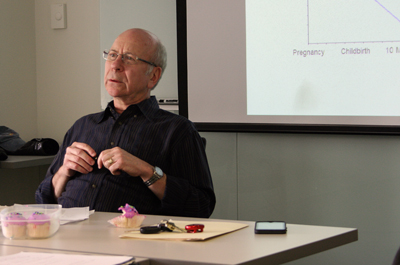During his 35 years at the University of Iowa, Michael O’Hara has provided safe harbor for graduate students looking to alter their course in pursuit of academic excellence.
When a relationship with their mentor doesn’t work out as planned, graduate students are left wondering which way to turn. In those instances, O’Hara, a professor of psychology in the College of Liberal Arts and Sciences, advises students on the best direction to take.

Some students decide to continue their doctoral studies under O’Hara’s supervision. O’Hara has been the primary advisor for 23 Ph.D. graduates. He is currently advising seven doctoral students. Approximately, one-third of these 30 graduate students began their academic careers working with another mentor.
To O’Hara’s credit, no graduate student has left his laboratory for another faculty advisor.
Due to his remarkable record for advising students, O’Hara has been selected winner of the 2014-15 Graduate College Outstanding Faculty Mentor Award in Social Sciences. O’Hara was nominated for the award by his students and colleagues.
“I take great pride in getting our students through the program,” O’Hara says. “The fact that both my current and former students really supported this nomination in words and deeds was extremely meaningful to me.”
Changing a career trajectory
Early in her graduate career at Iowa, Crystal Schiller was making plans for an alternate career path. Schiller had to either switch mentors or drop out of the clinical psychology program.
Schiller decided to meet with O’Hara, then director of graduate studies in psychology, before leaving academia all together. On the spot, O’Hara agreed to be her new mentor. He also advocated on Schiller’s behalf to help resolve the conflict with her former advisor.
“His confidence in me, and his sense of responsibility for me as a student in the department, bolstered my confidence and changed my career trajectory,” Schiller wrote in her nomination letter on O’Hara’s behalf.
Schiller went from nearly dropping out of school to earning her Ph.D. in 2011. She is currently an assistant professor of psychiatry at the University of North Carolina-Chapel Hill.
Jennifer McCabe-Beane, one of O’Hara’s current Ph.D. candidates, heard similar stories while administering a student evaluation of the faculty advisors in the clinical psychology program.
“I have always felt like I’ve had Mike in my corner. I am truly prepared to achieve my career goals thanks to the guidance he has offered,” McCabe-Beane wrote in her nomination letter on O’Hara’s behalf.
The research passion
O’Hara’s approach to research supervision starts with helping a student determine where his/her passion lies. A student’s passion sometimes is quite different from O’Hara’s own interests.
O’Hara says the most striking example of that is former graduate student Gail Rose. Rose wrote a dissertation on graduate students’ concepts of the ideal mentor, a topic far removed from O’Hara’s research interests of postpartum and pregnancy depression.
Rose’s dissertation resulted in at least two publications and her mentoring scales are still being used as part of faculty orientation at some institutions. Rose is currently an assistant professor of psychiatry at the University of Vermont.
“This example is emblematic of what I try to convey to my graduate students—‘I am here for your success. You are not here for my success,’” O’Hara says.
Amnon Kohen, professor of chemistry, was selected winner of the 2014-15 Graduate College Outstanding Faculty Mentor Award in Mathematics, Physical Sciences, and Engineering.
The 2014-15 faculty mentor awards recognize faculty in Mathematics, Physical Sciences, and Engineering and Social Sciences. In alternate years, the awards are presented to faculty in Humanities and Fine Arts and Biological and Life Sciences.